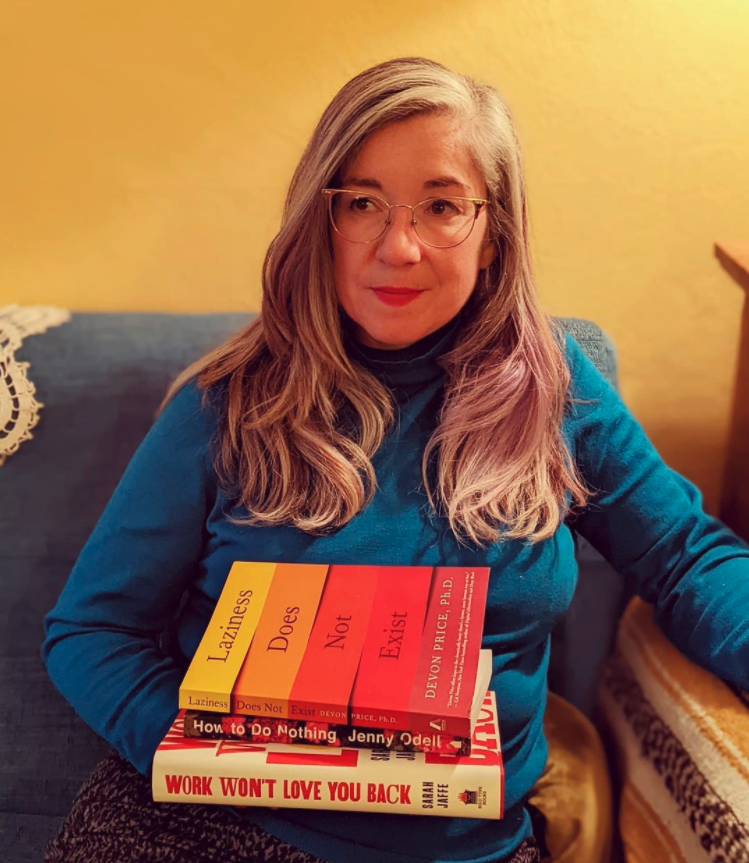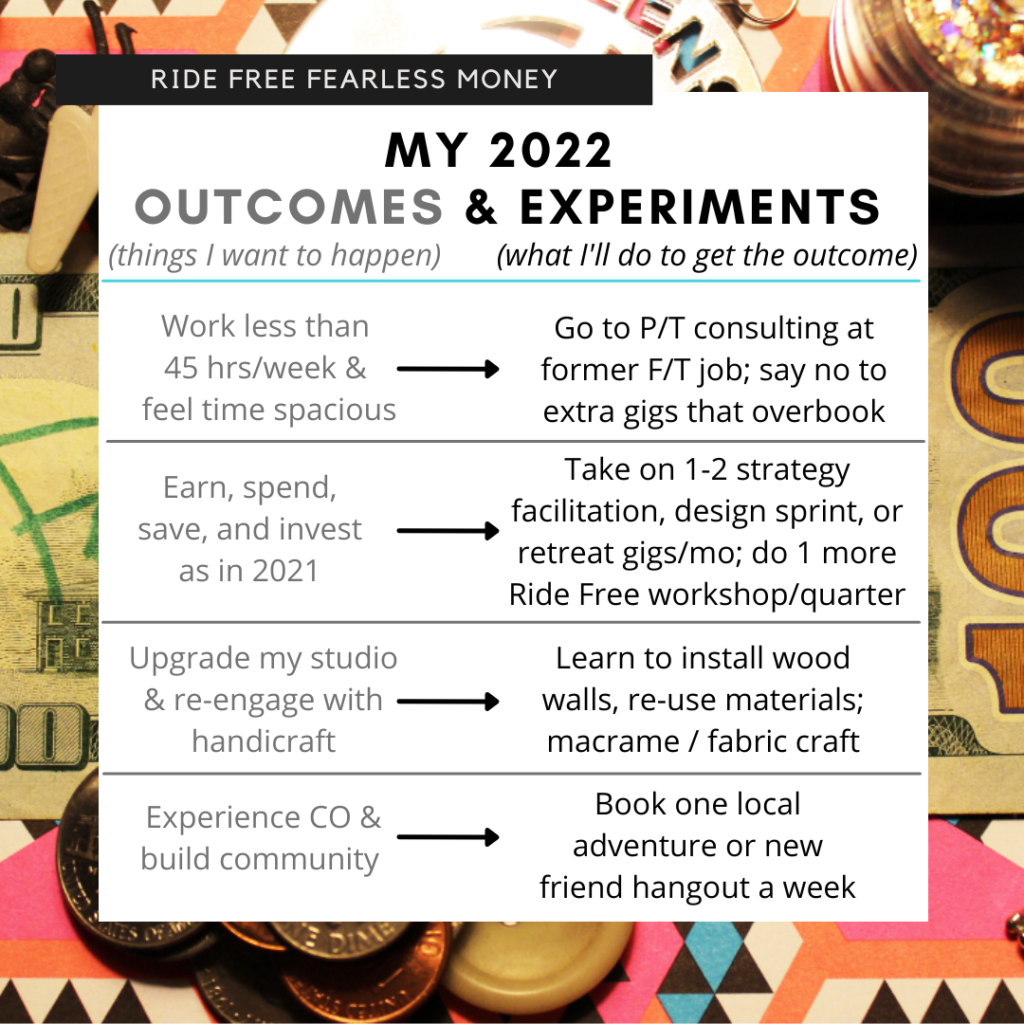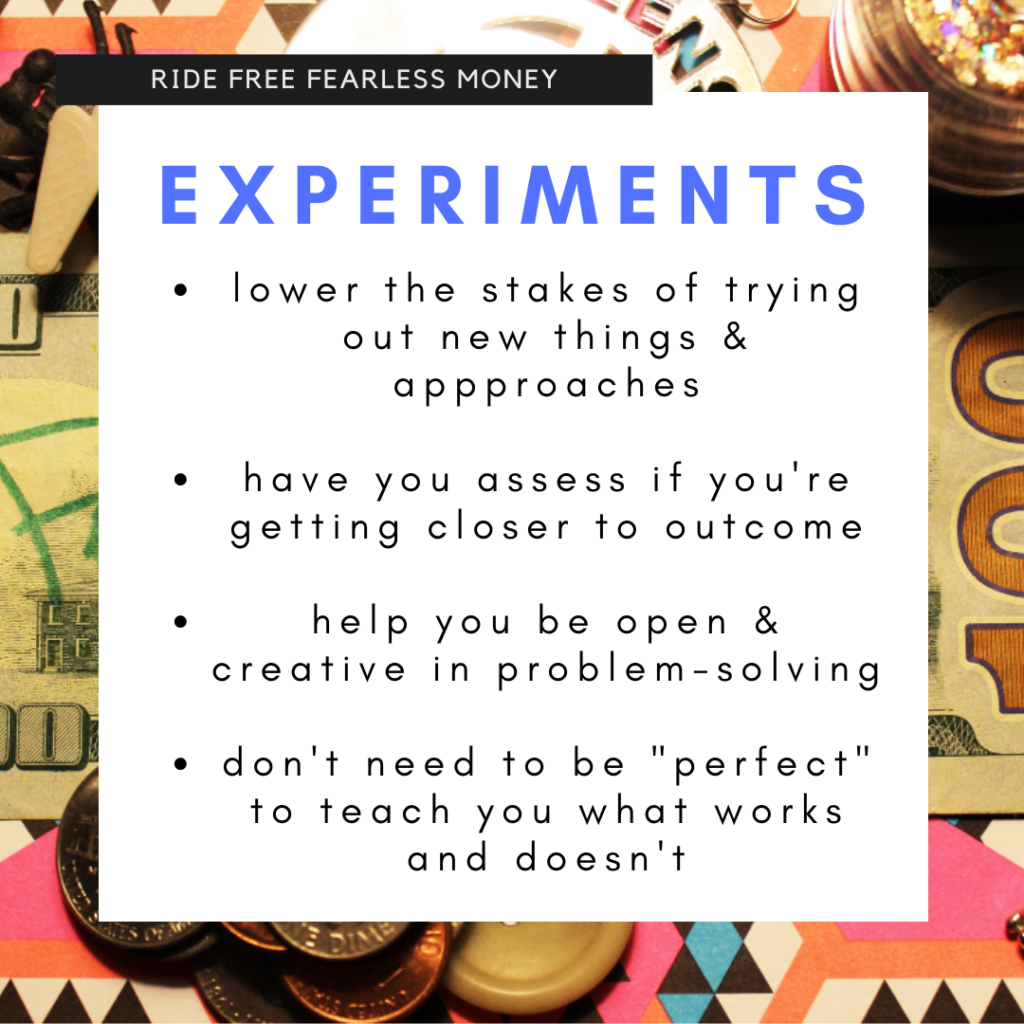Over the last 6-7 years, I’ve run two major money experiments to work on the challenges of:
- HOW do I make more money without hating my job and life?
- WHAT do I do with this “more” money I now make?
Going from making $39k to $65k to $125k to $170k [!] at my dayjobs in four years was a head-spinner. Crucially for purposes of my stability, I hella stacked. I invested in boring things [retirement plans] as well as took a few risks [real estate], and learned to put money to work for my future and goals.
Aside from money, I learned how to package my skills legibly [I am a design strategist and facilitator], gained evidence it’s possible for me to make money, and how to negotiate for the value of my work. I also used what I learned about income and what gets paid “out there” to boost my consulting rates, craft new types of projects, and expand the segments of clients and people I work with. I nailed demand, and found myself with work: so much work.
And so I did the work. Part of my experiment was making money, welcoming in money, and it aligned to say yes to it all.
This is all great when my main principle was “unfuck my totally fucked personal economic outlook.” I needed that focus and outcome. But – and this has been hard to recognize – my motivations and needs have changed, as I’ve achieved my goal. I’ve been able to look up from my focus and observe imbalance in my life.
I used to only produce for fun, which was contributing to my totally fucked economic outlook, but at some point I started producing mostly for money, which killed some of what makes having money worthwhile.
I needed a new life design principle. “Unfuck your money” turns out NOT to be useful as a singular focus if your principle includes “…and live while the living is good.”

The skills I don’t have, which I have been practicing trying out, are:
1 / saying no to money-making moments (as in, “that would be cool, but I am already too booked” – former me would squeeze it all in.)
2 / spending money non-optimally, for the present; I have to think about it and I get nervous. It feels out of line. I’m over here getting satisfaction spending practically – fix my boiler? ON IT. Dentist? DO YOU TAKE CHECKS? Commit to a donation schedule? YES MA’AM.
Commit to burndown some savings so I can get some rest over here? WHAT IS THAT ABOUT? It’s so uncomfortable, even though I have an emergency fund and a transition fund. I am still rigid, and have not accepted that I need to live into the change not just save through the change in case it changes back. I need to embody the choices I now have, feel confident, and move. That’s the growth of today.
But.
I know how to grind to build stability, I am now learning how to experience stability.
Now, I am on two new challenges (which require new experiments):
- How do I make good money and STOP my over-work habits?
- What happens when I USE money for the present?
See, one of the key ways I solved for experiment #1 in the past was “have several jobs” – I never wanted to be stuck [again] in a shitty job, and diversifying during the last recession proved to be a wise move.
But, I have to be honest, all the work I do these days I like. A lot.
Strategy and facilitation is a fascinating puzzle. Coaching is joyful and detailed. Service design and business design is a honorable challenge – to make people’s lives easier to live. Teaching is playful.
I don’t have to maintain a wall of “just in case extra work” – in fact, I need to do less, so I can realize the “don’t hate my life” part of the equation.
There’s nothing I hate per se, but I haven’t carved out enough time for the things I love these last few years. That’s why I’m excited to start a new freelance consulting life – I am going to get my work weeks down to ~40 hours, like my ancestors fought for.
Secondly, I am good – very good – at creating a savings and investing plan and executing on it. I can 100% help others get this going and it’s a game-changer. In fact, I changed my financial destiny in five years. I have choices past me only dreamed of. I’m not even ambiently mad at middle class people anymore [find punk me of 10 years ago and tell her that]. I could lose it all and now I know how to rebuild it [tho please god no].
But – when it comes to work and time, I’m still trying to get the balance right.
This fall, while planning ahead to work part time this winter and get some rest and fun around here, I took on a side project and worked on it while I came down with fucking covid. The “body needs boundaries” part of the experiment failed.
I am still experimenting with the right yes / no balance. Which feels like a money / freedom balance. A yes-to-me and no-to-fake-capitalist-urgency balance. I believe I can find it – this is why we experiment after all. The first take is usually a dud, but after a while, you land it.
Here’s to my new experiments:

With regards to work, I will contain my workweek to under 45 hours (I know, that’s still a lot, but it’s less than the 55-70 I’ve been doing!)
- 3-3.5 days/week – design strategy [part-time at my former full-time job – reducing my working days by 1.5/week
- 0-1 day/week – facilitation and innovation/design strategy consulting – adding a day every other week
- .5-1.5 day/week – Ride Free coaching, teaching, program and content work – keeping this the same!
Why “experiments”?
Ever since I started coaching businesses and people in 2015, and startups and teams in 2018, I found that people struggle with the stakes of their decisions.
“What if I try this new thing / different approach, and it fucks everything up FOREVER AND I DIE??”
Psst: This way of thinking doesn’t promote the change we need.
We need to be able to try new things without feeling afraid.
Enter – experiments.
With an experiment, you identify the outcome you want, then come up with a thing you’ll try ~for a defined period of time~ to see if you get closer to the outcome.
After the time period, you review what you did to see what you learn about if/how it moved the outcomes needle. Then, adjust as needed.
No judgement, no self-flagellating. Just: did it help me?
There’s always SO MANY things you can try, so I love the experimental method as a way to make it easier to pick one thing, speed up the rate of change, and keep from getting lost in the details.
